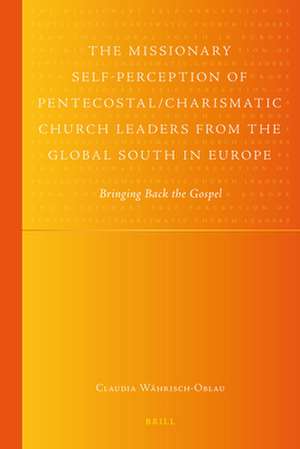The Missionary Self-Perception of Pentecostal/Charismatic Church Leaders from the Global South in Europe: Bringing Back the Gospel
Autor Claudia Währisch-Oblauen Limba Engleză Paperback – 22 feb 2012
Preț: 291.17 lei
Nou
Puncte Express: 437
Preț estimativ în valută:
55.72€ • 59.58$ • 46.45£
55.72€ • 59.58$ • 46.45£
Carte indisponibilă temporar
Doresc să fiu notificat când acest titlu va fi disponibil:
Se trimite...
Preluare comenzi: 021 569.72.76
Specificații
ISBN-13: 9789004228306
ISBN-10: 9004228306
Pagini: 428
Dimensiuni: 160 x 240 x 30 mm
Greutate: 0.7 kg
Editura: Brill
Colecția Brill
ISBN-10: 9004228306
Pagini: 428
Dimensiuni: 160 x 240 x 30 mm
Greutate: 0.7 kg
Editura: Brill
Colecția Brill
Cuprins
1. Methodological reflections
1.1 Introduction
1.2 The UEM Program for Cooperation between German and Foreign Language Churches, 1998 – 2008
1.3 Other European Protestant church responses to migrant churches: a short overview
1.4 Description of my research
1.5 Reflecting my own role as researcher and agent
1.6 Interpretative paradigms
2. The field of study
2.1 Terminology: Migrant churches
2.2 Delimiting Pentecostal / charismatic
2.3 Constructing a Pentecostal / charismatic discourse field
2.4 Migrant churches: Categorizations
2.5 Historical dynamics: Foundation and development of migrant churches
2.6 Migrant churches as part of a globalized discourse network
3. The role of the pastor: the relationship to one’s own congregation
3.1 The pastor as father and shepherd
3.2 Defending one’s call: Biographical stories as legitimation narratives
3.3 Mediators of divine power in a market situation: Observations and analysis
of the pastoral role
3.4 Summary: Mediators of divine power in a market situation
4. Following the call: Expatriation narratives
4.1 Theoretical framework: Some considerations
4.2 Intertwined call and expatriation narratives
4.3 Expatriation as consequence of the call
4.4 Expatriation and call narrative not connected
4.5 Expatriation narratives: some final observations
5. Being on a mission: the relationship to the outside world
5.1 “What is your mission?” Observations from the short interviews
5.2 Missionary practice: Evangelizing Germans
5.3 Conceptualizing evangelism in interdenominational dialogue: the long interviews
5.4 Imagining Germany and Europe
5.5 Conceptualizing evangelism in the global Pentecostal network:
The ‘spiritual warfare’ paradigm
5.6 Conclusion: Evangelism, inculturation and clashing paradigms
6. Consequences
6.1 The current situation
6.2 Dialogue fields: a description
6.3 Ecclesiology and the politics of difference: Who defines Christianity in Europe?
6.4 The functional question: Does a missionary self-image further or hinder integration?
6.5 The theological question: Are German churches ready to be evangelized?
Appendix:Expatriation narratives
Bibliography
1.1 Introduction
1.2 The UEM Program for Cooperation between German and Foreign Language Churches, 1998 – 2008
1.3 Other European Protestant church responses to migrant churches: a short overview
1.4 Description of my research
1.5 Reflecting my own role as researcher and agent
1.6 Interpretative paradigms
2. The field of study
2.1 Terminology: Migrant churches
2.2 Delimiting Pentecostal / charismatic
2.3 Constructing a Pentecostal / charismatic discourse field
2.4 Migrant churches: Categorizations
2.5 Historical dynamics: Foundation and development of migrant churches
2.6 Migrant churches as part of a globalized discourse network
3. The role of the pastor: the relationship to one’s own congregation
3.1 The pastor as father and shepherd
3.2 Defending one’s call: Biographical stories as legitimation narratives
3.3 Mediators of divine power in a market situation: Observations and analysis
of the pastoral role
3.4 Summary: Mediators of divine power in a market situation
4. Following the call: Expatriation narratives
4.1 Theoretical framework: Some considerations
4.2 Intertwined call and expatriation narratives
4.3 Expatriation as consequence of the call
4.4 Expatriation and call narrative not connected
4.5 Expatriation narratives: some final observations
5. Being on a mission: the relationship to the outside world
5.1 “What is your mission?” Observations from the short interviews
5.2 Missionary practice: Evangelizing Germans
5.3 Conceptualizing evangelism in interdenominational dialogue: the long interviews
5.4 Imagining Germany and Europe
5.5 Conceptualizing evangelism in the global Pentecostal network:
The ‘spiritual warfare’ paradigm
5.6 Conclusion: Evangelism, inculturation and clashing paradigms
6. Consequences
6.1 The current situation
6.2 Dialogue fields: a description
6.3 Ecclesiology and the politics of difference: Who defines Christianity in Europe?
6.4 The functional question: Does a missionary self-image further or hinder integration?
6.5 The theological question: Are German churches ready to be evangelized?
Appendix:Expatriation narratives
Bibliography
Notă biografică
Rev. Claudia Währisch-Oblau, Dr. theol. (Heidelberg University), is a member of the Management Team of the United Evangelical Mission and heads its Evangelism Department. She has published a number of articles on pentecostal / charismatic migrant churches in Europe
Recenzii
"Es handelt sich um ein Werk von grundlegender und richtungweisender Bedeutung, auf dessen Konsultation niemand, der oder die sich mit dem Phänomen von christlichen Migrationsgemeinden aus dem globalen Süden in Europa beschäftigt, wird verzichten können. Wer mit dem bisherigen Engagement und den Publikationen von Claudia Währisch-Oblau im Bereich der Migrationsgemeinden in Deutschland vertraut ist, den oder die wird diese Einschätzung kaum überraschen. Die Dissertation ist nicht nur das Ergebnis einer zeitlich umgrenzten Feldforschung im engeren Sinne, sondern sie bildet gleichzeitig den vorläufigen Abschluss einer über zehnjährigen intensiven, kontinuierlichen wie Früchte tragenden Zusammenarbeit mit diesen Gemeinden im erweiterten Ruhrgebietsraum. Kaum jemand anderem
wäre es möglich gewesen, eine solche Arbeit vorzulegen, setzt sie doch neben der akademischen Kompetenz der Forscherin wesentlich ein tiefes Vertrauensverhältnis zwischen ihr und den befragten Gemeindeleitern in der Migration voraus. Die Autorin vermag aus einem reichhaltigen Erfahrungsschatz zu schöpfen."
Werner Kahl, Interdisziplinäre Arbeitskreis Pfingstbewegung, 2011.
wäre es möglich gewesen, eine solche Arbeit vorzulegen, setzt sie doch neben der akademischen Kompetenz der Forscherin wesentlich ein tiefes Vertrauensverhältnis zwischen ihr und den befragten Gemeindeleitern in der Migration voraus. Die Autorin vermag aus einem reichhaltigen Erfahrungsschatz zu schöpfen."
Werner Kahl, Interdisziplinäre Arbeitskreis Pfingstbewegung, 2011.
